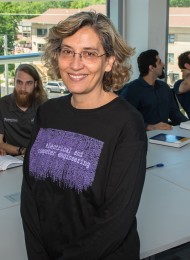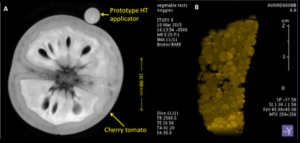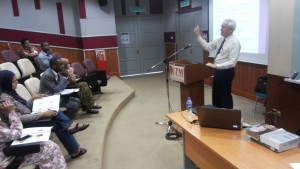MANHATTAN — Smart homes, smart infrastructure, smart health and more — the list of applications embedded with sensors, software and other technologies for the purpose of connecting and exchanging data with other devices continues to drive the need for rigorous analysis of hardware and software critical to ensuring the safety and security of these systems.
The National Science Foundation Division of Computing and Communication Foundations has awarded a $250,000, three-year grant to Xiaolong Guo, assistant professor in the Mike Wiegers Department of Electrical and Computer Engineering at Kansas State University, for further research in this area.
Guo will collaborate on the project “Property-specific Hardware-oriented Formal Verification Modules for Embedded Systems” with Tuba Yavuz, assistant professor of electrical and computer engineering at the University of Florida.
Things unique to their approach include a property-directed co-model extraction and a property-specific run-time validation process to achieve scalability and precision in detecting bugs due to hardware-software interactions.
“If successful, the research will deliver methodologies, automation tools and system-level benchmarks that will allow vendors to detect security and safety vulnerabilities in early stages,” Guo said. “Its greatest impact will be on workforce training and broadening participation in formal methods and embedded-system security.”
This will primarily be achieved through courses Guo will develop and teach in the Carl R. Ice College of Engineering, outreach events and collaborations with industry.



 In August 2013, our interdisciplinary research team was awarded a Major Instrumentation-Development grant from the National Science Foundation to develop an integrated instrument for small animal hyperthermia research under ultra-high field magnetic resonance imaging (MRI). The principal investigator of the project is Dr. Stefan Bossmann (Chemistry), with the instrument design, development, and integration aspects led by Dr. Punit Prakash (ECE). Other co-PIs on the project are Dr. Leila Maurmann (Chemistry), Dr. Sanjeev Narayanan (Diagnostic Medicine/Pathobiology), and Dr. Deryl Troyer (Anatomy and Physiology). Dr. Sergio Curto (ECE) is spearheading the implementation and evaluation of MRI-compatible hyperthermia applicators.
In August 2013, our interdisciplinary research team was awarded a Major Instrumentation-Development grant from the National Science Foundation to develop an integrated instrument for small animal hyperthermia research under ultra-high field magnetic resonance imaging (MRI). The principal investigator of the project is Dr. Stefan Bossmann (Chemistry), with the instrument design, development, and integration aspects led by Dr. Punit Prakash (ECE). Other co-PIs on the project are Dr. Leila Maurmann (Chemistry), Dr. Sanjeev Narayanan (Diagnostic Medicine/Pathobiology), and Dr. Deryl Troyer (Anatomy and Physiology). Dr. Sergio Curto (ECE) is spearheading the implementation and evaluation of MRI-compatible hyperthermia applicators. By Sarah Hancock
By Sarah Hancock
 gues and graduate students in Malaysia on Saturday, August 8th. He talked for two and a half hours on the basic principles of measurement and instrumentation and some practical applications for developing instruments. The venue was the University of Technology Malaysia or UTM. His host was Professor Sheroz Khan from the International Islamic University Malaysia. The audience comprised members of Professor Khan’s research group and of the local IEEE chapter. Together they provided an excellent venue with lovely food for a break and lunch.
gues and graduate students in Malaysia on Saturday, August 8th. He talked for two and a half hours on the basic principles of measurement and instrumentation and some practical applications for developing instruments. The venue was the University of Technology Malaysia or UTM. His host was Professor Sheroz Khan from the International Islamic University Malaysia. The audience comprised members of Professor Khan’s research group and of the local IEEE chapter. Together they provided an excellent venue with lovely food for a break and lunch.